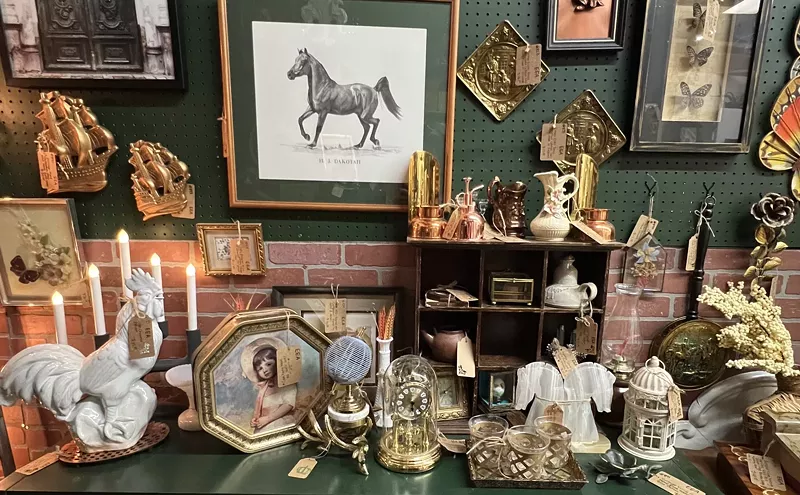No sooner had the curtain come down on opeing night of Central City Opera's production of Gioacchino Rossini's The Barber of Seville than several spectators began hailing the show as one of the best they'd ever seen at the jewel box of a theater. And you can well see why: Beautiful singing, marvelous acting and a strong dose of old-fashioned, tongue-in-cheek humor all combined to make director Francis Cullinan's sprightly staged production an entertaining evening.
The three-hour story begins with Rossini's famous overture, played with gusto by conductor Stephen Crout's solid orchestra. We're quickly introduced to Count Almaviva (Curt Peterson), a young nobleman who serenades a winsome maiden, Rosina (Margaret Lattimore), from afar. Before he can gain access to the object of his desire, however, Almaviva learns from his barber, Figaro (Richard Byrne), that the young woman's guardian, Dr. Bartolo (Jan Opalach), intends to marry the girl himself, prompting the count and his hairstylist-about-town to formulate a scheme that will effectively outwit the dotty physician and his slow-on-the-uptake sidekick, Don Basilio (Ryan Allen).
Leading the splendid company is Lattimore, who adroitly navigates the composer's florid score, a few phrases of which would constitute a daunting vocal workout for most singers. Sporting a rich coloratura voice, the alluring mezzo-soprano glides about the stage tossing off Rossini's light melodies with ease while exuding a vivacious charm. As she clenches her teeth and sings the admonition, "If you cross me, that is another thing," Lattimore's twinkling eyes and upturned mouth clearly convey Rosina's determination to do battle, albeit in ladylike fashion. And even though you get the feeling that Rossini's fiendishly difficult arias severely tax her stamina (understandable in Central City's oxygen-starved atmosphere), Lattimore's crystal-clear voice appears to grow stronger with every passing scene.
This is the case with Opalach's virtuoso portrayal of the hoodwinked doctor, as well. In addition to singing the thankless role with aplomb, the resonant bass-baritone also crafts a sublimely shaded portrait of a man whose capacity for feeling outweighs his ability to consummate his desires. As team-spirited a performer as he is an accomplished singer, Opalach's amusingly pragmatic Bartolo is upstaged only by the wonderfully comic antics of Byrne's crowd-pleasing, well-sung Figaro. And despite the fact that Peterson's Almaviva lacks panache early on, his comic turns manage to win our hearts by play's end. Indeed, as John Baril's gallant chorus of apprentices (a CCO training group that shaped the abilities of both Lattimore and Peterson a few years back) sings the last of Rossini's stirring finales, the opera's last words sound like a portent of things to come for the CCO's young artists: "The future will be bright, forever bright."
Providing another encouraging glimpse at what that future might hold are the student singers of the Colorado Lyric Theatre Festival, which, under the aegis of the University of Colorado School of Music, is presenting a repertory season of two comic operettas. Written seven years apart by the jolly William S. Gilbert and Arthur Sullivan (whose professional relationship unfortunately became less jolly over that same period of time), the festival's offerings represent the first and last great successes of Britain's most famous composing team. Under the imaginative and assured direction of New York show-business veteran William Mooney (best known for his role as Paul Martin on TV's All My Children, which earned Mooney a pair of Emmy nominations), an exuberant company pays fine homage to Gilbert and Sullivan.
When the two men formed their creative partnership in 1875, Gilbert was regarded as the foremost English dramatist of his day. As a result, the up-and-coming Sullivan frequently bent his musical notes around Gilbert's dialogue and lyrics, a situation that appears to have caused few serious problems in 1882 when the pair first presented Iolanthe. Mooney's version of the story begins with three card-playing stagehands lounging on a bare platform. As music director Robert Spillman conducts his finely textured orchestra in the playing of Sullivan's overture, a pirouetting fairy conjures the technicians to assemble the scenery. It's a clever device that has the effect of obliterating the imaginary wall that typically exists between actor and audience, making Mooney's insertion of modern-day references (which the performers deftly substitute for a few of Gilbert's outdated lyrics) compatible with the composers' love for relevant, topical satire.
And as the story unfolds, you can only imagine the guffaws that must have passed between the two wits when they cooked up their plot: An Arcadian shepherd, Strephon (Jason Baldwin), who is mortal from the waist down and fairy from the waist up (and talks continually of the bane of "penal servitude"), announces his intention to marry Phyllis (Amy Tefft), a ward of England's Lord Chancellor (Richard Walentine), who secretly wishes to pawn her off on one of his colleagues in the House of Lords. Enter Strephon's fairy mother, Iolanthe (Jennifer Robertson), whose eternally youthful appearance prompts a jealous Phyllis to break off her engagement to Strephon. Wishing to ensure her son's happiness for life, Iolanthe appeals to the Queen of the Fairies (Mary Hughes), who quickly responds by influencing London voters to elect Strephon to Parliament, where a delegation of, well, fairies is eventually inspired to pass landmark legislation.
Bedecked in sumptuous costumes (a first-rate effort for both festival productions by Tom Robbins), the adept warblers deliver impassioned renditions of the show's spine-tingling choral numbers. In fact, a red-robed, tuxedoed male chorus of peers makes an unforgettable impression (not to mention an apt commentary) when its dozen members haughtily intone, "Bow, bow, all ye not-so-well-connected/Bow, all ye who have to get elected." Their nimble fairy counterparts (a chorus of women who wind up blaming TV's Dr. Quinn, Medicine Woman for having sapped them of all carnal desires) eventually seduce the legislators through the power of dance (smartly choreographed by Marilyn Cohen). And as the festival's chief master of the patter song, Walentine induces raucous laughter from theatergoers when his character realizes he's mistaken the fairies' queen for the proprietor of a ladies' seminary. Most enjoyable of all, though, are principal performers Baldwin, Robertson, Hughes and Tefft, who, amid the scene-stealing frivolity of their colleagues, nonetheless manage to offer well-sung portrayals.
Completed in 1889 (around the time of Gilbert and Sullivan's relationship-ending quarrel over the costs to carpet their theater's lobby, the most famous upshot of which was Sullivan's declaration, "I am a cipher in the theater"), The Gondoliers serves as a perfect companion piece to Iolanthe. Though speculation continues today concerning the veiled insults that the two composers might have been sending to each other through song and verse, Mooney's rousing version of the show confirms what every Gilbert and Sullivan devotee has known ever since the show's London premiere: Gilbert's uninspired dialogue (including a couple of interminably long scenes that Mooney retains) stands in sharp contrast to the happiest music that Sullivan ever wrote.
Appropriately enough, that situation affords the festival's performers yet another chance to dazzle us with their remarkable singing voices. Mooney again begins his production with three characters (masked clowns, in this case) in order to punctuate moments of heightened theatricality. And to his credit, the director also elicits several outstanding portrayals from his leading actors. As the grand inquisitor Don Alhambra del Bolero, Stephen Soich brings to mind the outrageous shenanigans of SNL's Father Guido Sarducci--thick Castillian accent, brimmed hat and all. Exuding charisma as the young lovers Casilda and Luiz, Elizabeth Antle and Christopher Yorro color their soaring duets with a poignant innocence. The silver-throated Joshua Ian Elder and Jason Baldwin are winning as a pair of affable gondoliers who, owing to the confusion surrounding a marriage arranged in infancy, do their best to discover which one of them is the rightful King of Barataria. As their adoring wives, Lisa Jones and Katherine Soscia inject the comedy with some of the festival's most memorably sung episodes. And as the comically hubristic Duke of Plaza-Toro, Richard Walentine once again demonstrates his considerable skill as a singer of character roles. All of which is welcome assurance that the mantle of dignified silliness is once more in capable hands.
The Barber of Seville, through August 8 at the Central City Opera House, Eureka Street, Central City, 292-6700.
The Gondoliers and Iolanthe, presented by the Colorado Lyric Theatre Festival, through July 26 at the Imig Music Building, CU-Boulder campus, 492-8008.












